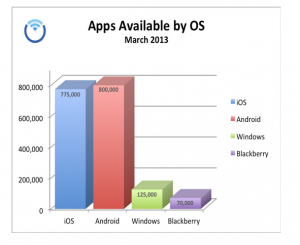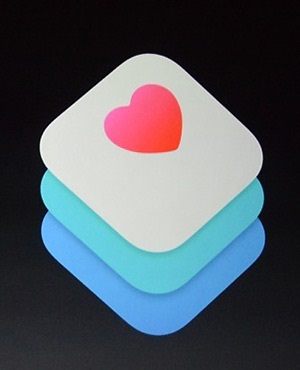Aldous Huxley: Technological progress has merely provided us with more efficient means for going backwards.
 You might think that there are already applications for everything but there are not. So just how far can apps go? Certainly, there are lots of applications which look ridiculous and which raise many questions like, ‘Do we really need it?’ ‘Who is going to use it?’ ‘What about privacy?’ Now that the app market is ‘mature’ and no longer just a competition about who has the most, both Apple and Google are tidying up 3rd party apps and paying more attention to quality.
You might think that there are already applications for everything but there are not. So just how far can apps go? Certainly, there are lots of applications which look ridiculous and which raise many questions like, ‘Do we really need it?’ ‘Who is going to use it?’ ‘What about privacy?’ Now that the app market is ‘mature’ and no longer just a competition about who has the most, both Apple and Google are tidying up 3rd party apps and paying more attention to quality.
To fully understand the where we are now we should have a look at a number of examples from different areas understand how some things, which looked unlikely, have become integral parts of our lives.
For example it would have been difficult to imagine only a few years ago just how much of personal information some people would voluntarily share with a website so that they can stay in contact with their friends family and acquaintances. Sharing personal details even with people they don’t even know! Yet a rapid inspection of our own pages on Facebook, or on Vkontakte reveal just how many of the information fields are filled in! Is it logical? Is it necessary? It is certainly fashionable. And look at what else we are sharing, thoughts, status, location, purchases, photos and videos, why are we doing that? Several years ago, few people could imagine that social networking would be as popular as it is today.
In the application world as well it is hard to imagine how things have ‘progressed‘. Take for example an application costing €100 dedicated to oral health and hygiene and associated with a toothbrush. At first sight this seems pretty interesting. It can show you how well you have brushed your teeth and if the rest of the family members have brushed their teeth. But, all the same it is not really progress. We have been brushing our teeth for years without it, and if you apply common sense rules, your teeth are going to be all right more or less. Observing new trends, I ask myself: What next? Applications for measuring your sexual activity [Passion]? Applications to motivate yourself [Motivation. Widget]? Applications making decisions for you [ChoiceMap] These might well transform your life but they can hardly be considered ‘progress‘!
Yet there are some recent developments which may well have the potential to transform our lives beyond recognition. Take for example the coming health revolution. Recently Apple and Samsung announced the creation of their own fitness monitoring platforms, HealthKit for Apple and S.A.M.I. for Samsung, which will unite different parties involved in healthcare such as fitness wearables manufacturers, connected medical device manufacturers, application developers and eventually medical institutes. Basically, both platforms will play the roles of intermediate between all those parties, gather information and provide it to concerned stakeholders whether it is your consulting physician or a group of researchers or even your application. Healthcare as we know it today will no longer exist. When you visit your physician you will no longer hear: « What seems to be the trouble? ». The first question may be: « Have you synced your data? » or « Which health application do you use? ». The doctor of the future will automatically know your symptoms and even be able to warn you if you have high temperature or low blood pressure.
However, with SAMI (Samsung Architecture Multimodal Interactions) Samsung has gone even further. Its Simband wrist-based sensor module claims to provide a reference architecture for any manufacturer to build their own monitoring devices. The Simband is a concept with an array of sensors that gather all possible information about your health with high accuracy. This strategic move from Samsung may well change wearable manufacturing significantly.
Considering these and other numerous examples, we should now realise that things which may look ridiculous and sound unlikely or incredible today may well become essential tools of tomorrow. As it is today with our mobile devices that have integrated so deeply into our lives it is hard to believe that we were able to live without them for so long so it will be for these new and unfamiliar objects in the near future.
Useful follow up links
- For more information about Apple’s health programme look at https://www.apple.com/ios/ios8/health/ and https://developer.apple.com/healthkit/
- To read more about Samsung’s healthcare programme follow http://www.samsung.com/us/globalinnovation/innovation_areas/
- To understand healthcare platforms from Apple and Samsung better, follow http://www.citeworld.com/article/2359460/mobile-byod/why-apples-healthkit-could-transform-health-care-in-very-short-order.html and http://www.citeworld.com/article/2198148/internet-of-things/samsung-sami-health-data-platform.html respectively.
- And for the limits of this approach see this opinion from the NYT http://www.nytimes.com/2014/06/17/upshot/apples-healthkit-probably-wont-bring-a-new-age.html?hpw&rref=&_r=0
- For more information about ‘perfect’ oral care look at: http://www.bbc.com/news/technology-25621422
- For people who experience a lack of motivation, here there is an app: https://play.google.com/store/apps/details?id=com.lucky.Motivator
- For the fun of measuring everything that can be measured, this app could be useful: https://itunes.apple.com/us/app/passion/id290950846?mt=8
- To discover the app, which can help you to take better decisions, look here: http://techcrunch.com/2014/01/09/meet-choicemap-a-new-app-that-helps-you-make-better-decisions/
- To know more about the future of mobile phones, see http://www.gadgets-reviews.com/index.php?page=post&id=421

2 réponses à “How far will we go?”
I think nowadays a lot of applications exist which are totally useless. That’s why we have to be careful about all the apps we install on our mobile phone.
Yes I do agree with you Iliya and with you too Mélanie. On my Iphone, I have more than 40 apps and I use everyday maybe only 8 of them. Many apps are useless ! But as you said Iliya, Samsung is changing the rules in every sector where the brand is involved. With the Samsung Gear the brand made a true innovation I think, but in other fields we can see the same type of fast development. There is currently an advertisement on TV, for the first HD screen curve, it is obvious that the competitors of Samsung will follow the trend and develop their own screen quickly. For the moment the innovations of Samsung are incremental and are not a real progress but it compel the competitors to innovate as fast as Samsung. This is a virtuous circle of innovation and we will see very soon great discoveries. It seems that Samsung is becoming increasingly powerful and the Korean will never stop their efforts to remain leader and pioneer on their sectors of activities.